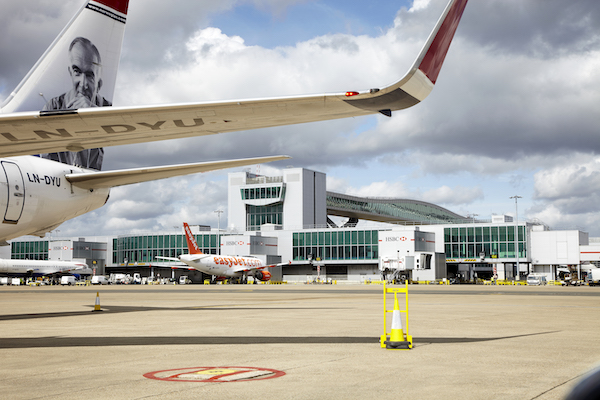Recently, more than 4,600 Gatwick Airport workers have received an average salary increase of 8.3%, bringing a wave of financial relief to numerous employees. This development follows successful negotiations led by the Unite union, resulting in favourable pay deals that reflect the important roles these workers play.
In addition to averting planned strikes, the agreement involves multiple employers across the airport, highlighting a collective effort to address wage disparities. These improvements represent a significant stride towards ensuring better compensation for essential workers, fostering a fairer working environment.
Significant Pay Increases Announced
In a significant development, more than 4,600 workers at Gatwick Airport have received an average pay rise of 8.3%. This follows negotiations led by the Unite union, representing workers across 11 different employers at the airport. The pay increase is part of ongoing efforts to improve compensation for roles often considered critical yet undervalued.
The union also revealed that two groups of staff who were planning industrial action have agreed to new pay proposals. The revised pay deals, which offer between 10.5% and 11% increases, underline the concerted push to align workers’ pay with the demands of their jobs. Such measures indicate a response to growing dissatisfaction among essential service providers at the airport.
Industrial Actions Averted
Approximately 400 passenger assistance workers at the airport had previously voted in favour of striking. However, the acceptance of a 10.5% pay rise offer resulted in the cancellation of the proposed industrial action. This resolution is poised to bring stability to operations that heavily rely on the availability of assistance personnel.
Similarly, 170 baggage screening workers who had opted for strike action have now accepted an 11% pay rise. This acceptance highlights the importance of negotiation in resolving disputes that could potentially disrupt airport operations. The new pay agreements not only address immediate financial concerns but are also seen as an investment in the workforce’s satisfaction and future productivity.
Details of the Pay Agreements
The agreements involve several employers, including Gatwick Airport management and significant service providers such as DHL EasyJet and Menzies.
These companies have agreed to an array of compensatory arrangements, including an 8% pay increase and a £900 one-off payment for nearly 1,900 airport employees directly under Gatwick’s employment. DHL EasyJet’s workforce, comprising 1,100 staff members, will benefit from a 9.8% pay raise. The enhanced pay structures reflect a shift towards more equitable remuneration in the aviation sector, recognizing the pivotal roles played by these workers.
Unite Union’s Role and Statement
The Unite union, instrumental in these negotiations, has stated that these positive outcomes are part of a broader strategy to enhance job conditions across Gatwick Airport. Unite’s general secretary, Sharon Graham, commented, “As these phenomenal results show, Unite is reversing the trend of jobs at Gatwick being underpaid and undervalued.” Her statement underscores the union’s commitment to advocating for fairer wages and improved working conditions.
Through organizing and strategic bargaining, the union has effectively secured better remuneration for a significant portion of the Gatwick workforce. This sets a precedent for future negotiations, emphasizing the union’s influence in securing favourable outcomes for its members.
Impact on Gatwick Operations
These wage adjustments are expected to positively impact Gatwick’s operational efficiency by reducing potential disruptions caused by labor disputes. With improved pay, worker satisfaction is likely to rise, leading to enhanced performance and retention rates. This is particularly crucial for airport operations, where skilled and dedicated staff are indispensable.
The stability brought about by these agreements can also aid in future strategic development, aligning employee welfare with Gatwick’s goals. Enhanced employee satisfaction can serve as a catalyst for improved service delivery, reflecting well on Gatwick’s brand reputation and operational reliability amidst competitive pressures in the aviation sector.
Reaction from Employers and Employees
The employers involved have expressed positive sentiments regarding the pay adjustments, highlighting their willingness to invest in their workforce. They recognise the value of retaining experienced staff and the benefits increased pay can have on morale and productivity.
Feedback from employees has been broadly positive, with many viewing the new agreements as a significant step towards recognition of their hard work. The raise addresses long-standing concerns about pay parity and working conditions, fostering an improved workplace environment.
Future Implications
The successful negotiation and implementation of these pay rises present a benchmark for similar agreements in the industry. Other airports and service providers might look to Gatwick’s example when addressing their own workforce challenges.
While it marks a positive shift, questions remain about the sustainability of such wage increases and how they will impact operational costs in the long term. Nevertheless, the emphasis on equitable pay is a step towards resolving workforce dissatisfaction and enhancing the overall work environment.
The recent pay increases at Gatwick Airport underscore a pivotal shift towards more equitable worker compensation and improved working conditions. These agreements have not only resolved immediate labour disputes but have also set a precedent for future negotiations, aligning workforce well-being with operational needs.
As Gatwick continues to enhance its operational framework, the focus on employee satisfaction is expected to contribute to the airport’s sustained success and reputation in the competitive aviation industry.

